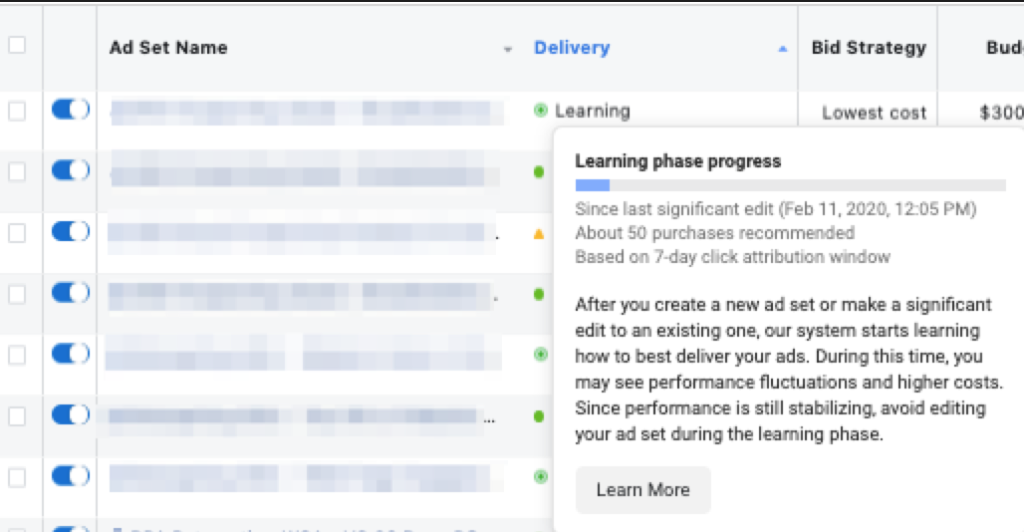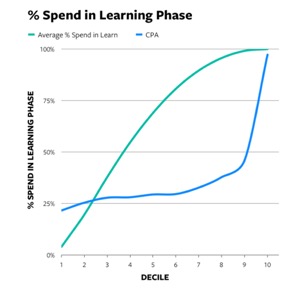February 25th, 2020
At the start of any Facebook ad campaign, it’s tempting to make tweaks to your budget, change up your bid strategy or reconsider your targeting if you’re not seeing the results you want right away. Worse, if your ad performance appears to have noticeable fluctuations within the first few days, making edits to your ad settings seems like the responsible thing to do. Facebook makes it so easy, and maybe with just a slight tweak here or there you can level out your results or up conversions, right?
As counterintuitive as it seems, the answer here is a loud and resounding, “No!” In fact, taking no action at all is the best move you can make at the start of your ad campaign. Why? Because your ad set is likely in the Learning Phase, a period of time at the beginning of any Facebook ad campaign — or immediately after significant edits to an existing ad set — when Facebook’s machine learning systems are figuring out how best to optimize your ad.
What exactly is Facebook’s Learning Phase?
When an advertiser launches a campaign or makes a major change to an ad set, Facebook’s ad delivery system takes a brief stretch of days to learn all it can about the environments that will create optimal results — this is called the Learning Phase. Think of it as a hyper-active testing period where Facebook is serving up your ad to all possible audiences and placements, fine-tuning the delivery process.
Facebook ad sets will exit the Learning Phase once performance stabilizes. Facebook says this usually happens when an ad set generates approximately 50 conversions within a seven-day period. This is why advertisers should hold off making any manual optimizations or edits to their Facebook ad campaigns within the first week of launch — any significant edits will “reset” the process, keeping your ad from exiting the Learning Phase.
According to Facebook, manual optimizations and edits that will keep your ad in the Learning Phase include:
- Major changes to campaign budgets, bid amounts or bid strategies.
- Any change to an ad, i.e. adding new creative or tweaking existing ad elements.
- Modifications to an ad sets’ targeting and placement options or the optimization event.
- Pausing an ad set for more than seven days.
Is there a way to find out if my ad is still in the Learning Phase?
The quick answer: yes. The Learning Phase process isn’t new, but Facebook has only recently rolled out a feature that gives advertisers more insight into the ad optimization process. You may have noticed it already if you spotted the “Learning” label in the delivery column of your ad sets. The label lets advertisers know how far their ad has progressed within the “Learning Phase” process.

The feature is still rolling out so some advertisers may not have access to it yet, but that doesn’t mean their ads are not undergoing a Learning Phase — just that their Ads Manager hasn’t been updated to show the progression.
How will the Learning Phase impact my campaign?
Do not fret if your ad performance results are unstable during the Learning Phase, that’s the whole point of the process. “During the learning phase, the delivery system is exploring the best way to deliver your ad set — actively trying different audiences, placements and more — so performance has not yet stabilized,” explains Facebook.
This also means advertisers will most likely experience higher cost per acquisitions (CPAs) during the Learning Phase. Facebook recommends advertisers allocate a smaller share of their budget during the Learning Phase so that the majority of the budget will be spent once the ad performance has stabilized and CPAs will be lower.
Facebook shared the following graph using data from June, 2019 to demonstrate how the Learning Phase may impact CPAs. “Advertisers with ~20% of spend in the learning phase (2nd decile) see 17% more conversions and 15% lower CPA than advertisers with ~80% of spend in the learning phase (6th decile),” reports Facebook.

Facebook recommends advertisers spend no more than 20% of their budget during the Learning Phase so that the bulk of the budget is spent after the ad has been optimized for best results, maximizing the advertiser’s investment.
What does “Learning Limited” mean and what can I do to resolve it?
There are times when an ad is unable to collect enough data during the Learning Phase and cannot be optimized by Facebook’s delivery system. When this happens, the ad is labeled “Learning Limited” in the Delivery column and the advertiser will have to make significant changes to the ad set to exit the Learning Phase.
To avoid receiving a “Learning Limited” status — or to resolve the issue should it occur — Facebook recommends the following actions:
- Refrain from low bid control or cost control, or setting a campaign budget too low.
- Avoid small audience sizes — if your target audience is too limited, Facebook will be unable to accurately optimize the ad.
- Limit the number of ad sets you have running at the same time. (Facebook announced last November that, later this year, it will limit the number of ads a Page can run simultaneously because high ad volumes hinder an advertiser’s performance. This hasn’t been enforced yet, so for now, it is up to the advertiser to limit the number of ad sets running at once.)
- Combine ad sets to avoid audience overlap and to keep alternative ad sets running from the same ad account or Page from winning the auctions instead.
- Make sure your optimization event isn’t a hard-to-win action that occurs infrequently. “Consider optimizing for an event that occurs more frequently,” suggests Facebook, “For example, if you see fewer than 50 purchase events in a week, consider optimizing for add to cart events instead.”
The important thing to remember is not to get discouraged if you receive a “Learning Limited” notification in the Delivery column. It only means your ad set has not gathered enough conversion data to reach peak performance. A quick review and edit of your ad settings will likely resolve the issue.
Does CBO influence the Learning Phase?
Facebook says the Learning Phase will not take any longer for advertisers who have implemented Campaign Budget Optimization (CBO) — a feature that sets the ad budget at the campaign level (something that will soon be mandatory for all ads). It also confirmed that ad sets within a campaign will not be forced to re-enter the Learning Phase as the campaign budget is distributed via CBO — and that making a significant edit to one ad set within a campaign will not cause an ad set within the same campaign to re-enter the Learning Phase.
One thing to consider in terms of CBO and the Learning Phase is how you set your budget. Because you’re setting the budget at the campaign level, you’ll have to make sure you’re spending enough to support each individual ad set within the campaign — too low of a budget could keep one or more of your ad sets from exiting the Learning Phase.
Still have questions? We can help
If you are still in the “learning phase” of the Facebook advertising ecosystem, and are a bit overwhelmed when it comes to creating and launching campaigns, we’re here to help. AKvertise works with all types of businesses to develop Facebook ad campaigns that deliver exceptional results. Our team is on stand-by to answer any questions you may have about Facebook’s Learning Phase — or any other social media marketing inquiries. We offer consulting, account management and even agency training services. Want more information? Contact us now and we will set up a time to talk about your social media marketing needs.
Share: